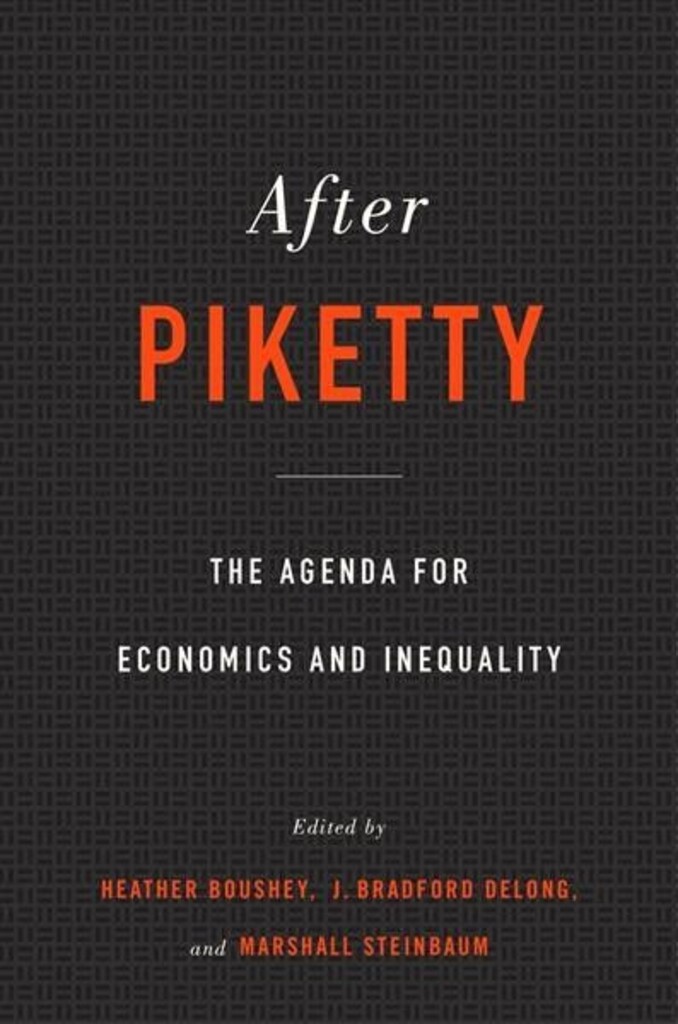After Piketty : the agenda for economics and inequality
edited by Heather Boushey, J. Bradford DeLong, Marshall Steinbaum
Bok Engelsk 2017 · Aufsatzsammlung
| Medvirkende | |
|---|---|
| Omfang | viii, 678 sider : figurer
|
| Opplysninger | Introduction: Capital in the twenty-first century / J. Bradford DeLong, Heather Boushey, and Marshall Steinbaum -- I. Reception: The Piketty phenomenon / Arthur Goldhammer -- Thomas Piketty is right / Robert Solow -- Why we're in a new Gilded Age / Paul Krugman -- II. Conceptions of capital: What's wrong with capital in the twenty-first century's model? / Devesh Raval -- What's missing from capital in the twenty-first century? Power / Suresh Naidu -- The ubiquitous nature of slave capital / Daina Ramey Berry -- Human capital and wealth before and after capital in the twenty-first century / Eric Nielsen -- Understanding income inequality in the US: technology and capital in the twenty-first century / Laura Tyson and Michael Spence -- Income inequality, wage determination, and the fissured workplace / David Weil -- III. Dimensions of inequality: The capital income share and interpersonal inequality / Branko Milanovic -- Global inequality / Christoph Lakner -- We're all in this together: inequalities and the zone / Gareth Jones -- The inequality research agenda: data, interpretation, policy / Emmanuel Saez -- Macro models of wealth inequality / Mariacristina De Nardi, Giulio Fella, and Fang Yang -- A feminist interpretation of patrimonial capitalism / Heather Boushey -- What does Piketty mean to macroeconomic forecasting and policy-making? / Mark Zandi -- Rising inequality and economic stability / Salvatore Morelli -- IV. The political economy of capital and capitalism -- The great decline of inequality and the ideology of capitalism / Marshall Steinbaum -- The legal foundations of Piketty's laws of capitalism / David Singh Grewal -- The historical origins of the great divergence / Ellora Derenoncourt -- Implications of capital in the twenty-first century for political science / Elisabeth Jacobs -- Piketty responds: Thomas Piketty. - Thomas Piketty's Capital in the Twenty-First Century is the most widely discussed work of economics in recent history, selling millions of copies in dozens of languages. But are its analyses of inequality and economic growth on target? Where should researchers go from here in exploring the ideas Piketty pushed to the forefront of global conversation? A cast of economists and other social scientists tackle these questions in dialogue with Piketty, in what is sure to be a much-debated book in its own right. After Piketty opens with a discussion by Arthur Goldhammer, Piketty's translator into English, of the reasons for Capital's phenomenal success, followed by the published reviews of Nobel laureates Robert Solow and Paul Krugman. The rest of the book is devoted to newly commissioned essays that interrogate Piketty's arguments. Suresh Naidu and other contributors ask whether Piketty said enough about power, slavery, and the complex nature of capital. Laura Tyson and Michael Spence consider the impact of technology on inequality. Heather Boushey, Branko Milanovic, and others consider topics ranging from gender to trends in the global South. Emmanuel Saez lays out an agenda for future research on inequality, while a variety of essayists examine the book's implications for the social sciences more broadly. Piketty replies to these questions in a substantial concluding chapter. An indispensable interdisciplinary work, After Piketty does not shy away from the seemingly intractable problems that made Capital in the Twenty-First Century so compelling for so many.--
|
| Emner | Piketty, Thomas , 1971-
Capital - Social aspects Equality - Economic aspects Wealth Vis mer... Capitalism
Economic equality Economic inequality Income distribution Wage determination Wealth distribution Einkommensverteilung Vermögensverteilung Wirkungsanalyse Wirtschaftswachstum Technischer Fortschritt Kapital Umverteilung Welt Inntektsfordeling Kapitalisme Kapitalismus Soziale Ungleichheit Velstandsutvikling Vermögen Vermögen |
| Sjanger | |
| Dewey | |
| ISBN | 9780674504776
|
After Piketty : the agenda for economics and inequality
edited by Heather Boushey, J. Bradford De...
Bok · Engelsk · 2017
edited by Heather Boushey, J. Bradford De...
Bok · Engelsk · 2017
